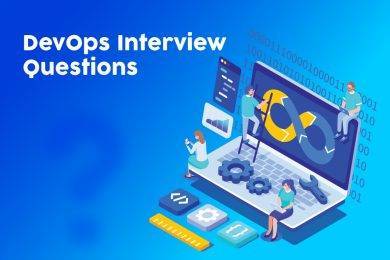Understanding DevOps
DevOps is a unit of people, process, and product to enable the continuous delivery of value to end-users. Now let’s use the following example to show you the differences between a traditional team and a DevOps team and how the DevOps team is able to deliver value more frequently, rapidly, and reliably. Here are two companies. One uses a traditional software delivery process, and the other embrace DevOps. Both companies have an e-commerce website. A requirement comes in to add a new feature called Customer Also Bought to the check-out experience.
In company A, analysts spend two weeks analyzing the requirements. They pass the document over to developers, who spend one month developing a feature—the developer’s handoff to testers who spend another week testing. Then testers pass on to the operations team, who spend another week provisioning a new server before deploying the new bits. However, in the end, the new feature isn’t quite delivering what the business wanted. Operations blame the developers, the developers blame the testers, and the testers blame business for unclear requirements. The team members are angry and frustrated. In the meanwhile, customers are leaving their site. In company B, business analysts, developers, testers, and the operations team all sit together to do some planning. They decide on implementing a small slice of the full feature so that they can see how the feature will be received by their customers. The operations team creates a script to provision and configure a new server. The testers start automating tests using the same script from operations to provision test environments. The developers are coding. After just one week, the feature is released and tested using a continuous deployment pipeline. The operations team configure a small selection of users to receive the new feature in production. After a couple of days of A/B testing, the analysts study a report on the usage and interview customers on their experience. The team refines the feature and deploy it again after one week. The team is happy, customers are happy, a lot of new customers are coming to their site. DevOps Training definitely makes your application life cycle faster and more predictable.
The role of a DevOps is developing plus operating, which makes the work extremely technical. As a DevOps engineer, you need to have a basic idea of how programming languages work. You should be able to know what, when and how to build and where to deploy it. Having an AWS DevOps certification is an industry-recognized credential carrying high weightage. It helps get recruited by different big companies who are looking for highly skilled individuals. DevOps is more than just a set of DevOps tools training and people and practices, it’s a culture, and it grows from within the organization, and it can change in the organization. And you’ll find organizations that have a strong culture, this focus on delivery, this focus on production, will be able to grow that DevOps culture very rapidly and efficiently. Others are a culture of measurement, where we’re actually going in and understanding what we’re doing. This isn’t just getting log files, although that’s a big part of it. But it understands everything that’s happening, AB testing, looking at our features as they’re going out, hypothesis-driven development.
PREREQUISITES:
For becoming an AWS certified DevOps engineer, you should first clear the foundation and associate level AWS certifications so that you stand eligible; those are more basic or foundational level exams. So, becoming an AWS certified SysOps administrator is a must before becoming an AWS DevOps engineer. There are certain things one should be aware of, and they are database, application services, storage, compute and network, analytics, deployment and management. You must have an idea of knowing how to cater to small and big projects alike; that is, your mind should be capable of auto-scaling. It is considered a bonus if you have an additional two years of experience in designing and troubleshooting the solutions on the AWS cloud. The engineers should know how to set security controls. They should be able to manage the systems, which are delivered continuously. AWS has a logging system along with metrics data, which needs to managed or say monitored by an AWS DevOps engineer; the responsibility of deploying and defining the system is also on the engineer.
It’s a collaboration between development and operation, there’s DevOps, but more than that, it reaches beyond; it needs to bring in the project managers. It needs to bring in the people gathering the requirements; it pulls in the people maintaining the application, it pulls in customer service. It’s a lot more than just development and operations.
My name is Sardar Ayaz a professional content writer and SEO expert having Proven record of excellent writing demonstrated in a professional portfolio Impeccable grasp of the English language, including idioms and current trends in slang and expressions. I have ability to work independently with little or no daily supervision with strong interpersonal skills and willingness to communicate with clients, colleagues, and management.
I can produce well-researched content for publication online and in print, organize writing schedules to complete drafts of content or finished projects within deadlines. I have 12 years’ experience to develop related content for multiple platforms, such as websites, email marketing, product descriptions, videos, and blogs.
I use search engine optimization (SEO) strategies in writing to maximize the online visibility of a website in search results











